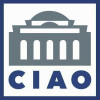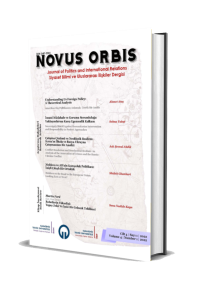Araştırma Makalesi
Kitap İncelemesi
Amaç ve Kapsam
NOVUS ORBIS:
Siyaset Bilimi ve Uluslararası İlişkiler Dergisi / Journal of Politics and International Relations
NOVUS ORBIS, Karadeniz Teknik Üniversitesi, Uluslararası İlişkiler Bölümü ve Karadeniz Teknik Üniversitesi, Stratejik Araştırma Merkezi’nin (KTÜ-SAM) katkılarıyla Siyaset Bilimi ve Uluslararası İlişkiler alanlarında Nisan 2019 itibariyle yayınlanmaya başlanan akademik bir dergidir.
Siyaset Bilimi ve Uluslararası İlişkilerin her boyutuyla ilgili çalışmalara yer verilen dergi hakemli yapıda oluşturularak kalite ve etkinlik alanında yetkinliğe ulaşmayı hedeflemektedir. Dergide kuramsal ve analitik özgün çalışmaların yanı sıra kitap incelemelerine de yer verilmektedir.
NOVUS ORBIS, kalite ve güvenden ödün vermeden ulusal ve uluslararası kamuoyuna hitap eden, yeni fikirler ve açılımlar ortaya koyan bir yapıya sahip olmak ve yaygınlaşmak amacındadır.
NOVUS ORBIS, Haziran ve Aralık olmak üzere yılda 2 sayı olarak yayımlanmakta hem Türkçe hem de İngilizce dillerindeki çalışmalara yer veren akademik, uluslararası hakemli bir dergidir.
Yazım Kuralları
- Yazım dili Türkçe ve İngilizcedir.
- Yazıların toplam uzunluğu en az 5.000, en fazla 10.000 kelime (notlar ve referanslar dahil) olmalıdır.
- Makalenin başlangıç kısmında, Türkçe ve İngilizce olarak hazırlanmış makale başlıklarını da içeren 250 kelimeyi aşmayan özet ile Türkçe ve İngilizce beş anahtar kelime bulunmalıdır. Türkçe makalelerin sonuna ise 750-800 kelimelik “Extended Abstract” başlığı altında uzun İngilizce özet eklenmelidir.
- Yazar adı, ortaya, italik koyu, 12 punto olarak yazılmalı; unvanı, görev yeri ve elektronik posta adresi dipnotta (*) işareti ile 10 punto yazılarak belirtilmelidir. Diğer açıklamalar için yapılan dipnotlar metin içinde ve sayfa altında numaralandırılarak verilmelidir.
- Yazı karakteri Georgia, 12 punto, satırlar tek aralıklı, dipnotlar 10 punto ve tek aralıklı yazılmalıdır.
- Marjlar: Üst 3,5 cm, alt 3,5 cm, sol 4.5 cm, sağ 4.5 cm, cilt payı 0 cm, üst bilgi 1.25 cm, alt bilgi 2.5 cm.
- Paragraflar arası önceki 3 nk, sonra 3 nk, iki yana dayalı olmalıdır.
- Alt başlıklar kendisinden önce gelen başlıktan 3 karakter içeride olmalıdır.
Referans Esasları
- Novus Orbis'e gönderilen yazılar, referans sistemi, dipnot gösterme biçimi ve kaynakça düzenlenmesinde American Psychological Association (APA) stilinde hazırlanmalıdır.
Detaylı bilgi için gerekli belgeyi buradan indirebilirsiniz...
Etik İlkeler ve Yayın Politikası
Publication Ethics and Malpractice Statement
Ücret Politikası
Dergide makale yayını ve makale süreçlerinin yürütülmesi ücrete tabi değildir. Dergiye gönderilen ya da yayın için kabul edilen makaleler için işlem ücreti ya da gönderim ücreti alınmaz.
Dizinler
Dergi Kurulları
Editör Kurulu
- Doç. Dr. Özgür Tüfekçi – Karadeniz Teknik Üniversitesi, Türkiye | ozgurtufekci [at] ktu [dot] edu [dot] tr | +90 462 377 3227
- Dr. Öğr. Ü. Hülya Kınık – Karadeniz Teknik Üniversitesi, Türkiye | hulya.ercan [at] ktu [dot] edu [dot] tr
- Dr. Öğr. Ü. Göktuğ Kıprızlı – Karadeniz Teknik Üniversitesi, Türkiye | goktugkiprizli [at] ktu [dot] edu [dot] tr
- Arş. Gör. Fevzi Kırbaşoğlu - Karadeniz Teknik Üniversitesi, Türkiye | fkirbasoglu [at] ktu [dot] edu [dot] tr
Alan Editörleri*
- Dr. Öğr. Ü. Fatma Akkan Güngör – Karadeniz Teknik Üniversitesi, Türkiye | fatmaakkangungor [at] ktu [dot] edu [dot] tr
- Dr. Öğr. Ü. Yılmaz Bayram – Karadeniz Teknik Üniversitesi, Türkiye | yilmazbayram [at] ktu [dot] edu [dot] tr
- Doç. Dr. Ayça Eminoğlu – Karadeniz Teknik Üniversitesi, Türkiye | aeminoglu [at] ktu [dot] edu [dot] tr
- Doç. Dr. Vahit Güntay – Karadeniz Teknik Üniversitesi, Türkiye | vahit.guntay [at] ktu [dot] edu [dot] tr
- Doç. Dr. Erol Kalkan – Karadeniz Teknik Üniversitesi, Türkiye | erolkalkan [at] ktu [dot] edu [dot] tr
- Prof. Dr. İsmail Köse – Karadeniz Teknik Üniversitesi, Türkiye | ismailkosetr [at] ktu [dot] edu [dot] tr
- Doç. Dr. Bülent Şener – Karadeniz Teknik Üniversitesi, Türkiye [at] ktu [dot] edu [dot] tr
- Doç. Dr. Murat Ülgül – Karadeniz Teknik Üniversitesi, Türkiye [at] ktu [dot] edu [dot] tr
Uluslararası Danışma Kurulu*
- Dr. Shane Brennan – American University in Dubai, Birleşik Arap Emirlikleri | sbrennan [at] adu [dot] edu
- Dr. Alessia Chiriatti – University for Foreigners of Perugia, İtalya | alessia.chiriatti [at] gmail [dot] com
- Prof. Dr. Murat Çemrek – Necmettin Erbakan Üniversitesi, Türkiye | mcemrek [at] konya [dot] edu [dot] tr
- Doç. Dr. Rahman Dağ – Zonguldak Bülent Ecevit Üniversitesi, Türkiye | rahman.dag [at] beun [dot] edu [dot] tr
- Dr. Federico Donelli – University of Genoa, İtalya | federico.donelli [at] edu [dot] unige [dot] it
- Prof. Dr. Süleyman Erkan – Karadeniz Teknik Üniversitesi, Türkiye | serkan [at] ktu [dot] edu [dot] tr
- Prof. Dr. Monique Sochaczewski Goldfeld – Escola de Comando e Estado-Maior do Exército, Brezilya | ppgcm [dot] eceme [dot] eb [dot] mil br
- Prof. Dr. Ayla Göl – Aberystwyth University, İngiltere | dr.ayla.gol [at] gmail [dot] com
- Prof. Dr. Emre İşeri – Yaşar Üniversitesi, Türkiye | emre.iseri [at] yasar [dot] edu [dot] tr
- Prof. Dr. Gökhan Koçer – Karadeniz Teknik Üniversitesi, Türkiye | g.kocer [at] ktu [dot] edu [dot] tr
- Dr. SungYong Lee – University of Otago, Yeni Zelanda | sungyong.lee [at] otago [dot] ac [dot] nz
- Doç. Dr. Ali Onur Özçelik – Eskişehir Osmangazi Üniversitesi, Türkiye | alionur.ozcelik [at] gmail [dot] com
- Prof. Dr. Alp Özerdem – George Mason University, Amerika | aozerdem [at] gmu [dot] edu
- Dr. Öğr. Ü. Kaand Renda – Hacettepe Üniversitesi, Türkiye | kadri.renda [at] hacettepe [dot] edu [dot] tr
- Dr. Paul Richardson – University of Birmingham, İngiltere | p.b.richardson.1 [at] bham [dot] ac [dot] uk
- Prof. Dr. Didem Ekinci Sarıer – Çankaya Üniversitesi, Türkiye | didemekinci [at] cankaya [dot] edu [dot] tr
- Doç. Dr. Hüsrev Tabak – Recep Tayyip Erdoğan Üniversitesi, Türkiye | husrev.tabak [at] erdogan [dot] edu [dot] tr
- Prof. Dr. Coşkun Topal - Karadeniz Teknik Üniversitesi, Türkiye | coskuntopal [at] ktu [dot] edu [dot] tr
- İsimler alfabetik olarak soyadlarına göre sıralanmıştır.



Baş Editörler

Dr. Ozgur Tufekci is an Associate Professor of International Relations at Karadeniz Technical University, Turkey. He is also the founder and Director-General of CESRAN International, a UK-based think-tank (www.cesran.org). He holds an MA in International Studies from the University of Sheffield, UK, and a PhD in Sociology and International Relations from Coventry University, UK. His primary research interests are [Turkish] Eurasianism, Nation-Building, Theories of Nationalism, Geopolitical Studies, Rising Powers and Regionalism. His PhD thesis, “The Foreign Policy of Modern Turkey: Power and the Ideology of Eurasianism” has been accepted for publication by I.B. Tauris. He is the Editor-in-Chief of the Journal of Global Analysis (www.journalofglobalanalysis.com), Senior Editor of Caucasus International (www.cijournal.az), and Section Editor of the International Journal of Economics and Administrative Studies. Email: oztufekci [at] cesran.org | oz_tufekci [at] yahoo.com

Fevzi Kırbaşoğlu works as Research Assistant of the International Relations Department at Karadeniz Technical University (KTU), Türkiye. He received MA degree in 2019 from the International Relations Department of KTU, with a thesis entitled “The EU’s Response to Rising Powers: The Case of Turkey”. In the same year, he started his doctoral studies in the field of International Security and Terrorism under the Council of Higher Education's (CoHE) prestigious 100/2000 PhD Scholarship Program. His current research interests include EU Law and Institutions, European Political Integration, and the geopolitical dynamics of the Black Sea region.

Hülya Kınık is Assistant Professor of International Relations at Karadeniz Technical University, Turkey. She holds PhD on International Relations from Karadeniz Technical University, Turkey. Her dissertation explores the effects of Rising Powers on the international system, mainly focusing on Turkey. Her primary research interests are Turkish Foreign Policy, Rising Powers and Geopolitical Studies.
Kitap İncelemesi Editörü

Mizanpaj Editörü

Alan Editörleri




Yardımcı Editör

Uluslararası Danışma Kurulu

 Web
Web
Prof. Dr. Emre İşeri, Yaşar Üniversitesi, İnsan ve Toplum Bilimleri Fakültesi, Uluslararası İlişkiler Bölümü, İzmir, Türkiye.



Ali Onur Özçelik, Eskişehir Osmangazi Üniversitesi Uluslararası İlişkiler Bölümü’nde Profesör ve tam zamanlı öğretim üyesidir. Lisansüstü eğitimini Birmingham Üniversitesi’nde Transatlantik İlişkiler alanında, doktora eğitimini ise Sheffield Üniversitesi Siyaset Bölümü’nde tamamlamıştır. Önceki çalışmaları, özellikle Türk yerel yönetimlerinin durumu bağlamında Avrupaileşme ve çok düzeyli yönetişim konularına odaklanmıştır.
Özçelik’in araştırma alanları devlet dışı aktörlerin siyaseti, ulusötesi toplumsal hareketler, tanınmamış veya sınırlı tanınırlığa sahip aktörlerin diplomasisi ve Avrupa Birliği’nin Komşuluk Politikası gibi konuları kapsamaktadır. Son yıllarda ise çalışmalarını küreselleşme, dünya düzeninin dönüşümü ve uluslararası ilişkilerde işlemsellik (transactionalism) gibi temalara yöneltmiştir.
Özçelik, The World Community and the Arab Spring (Palgrave Macmillan), EU Conditionality in Turkey: When Does It Work? When Does It Fail? (Rowman & Littlefield) ve Reconfiguring EU Peripheries: Political Elites, Contestation and Geopolitical Shifts (Helsinki University Press) adlı üç akademik kitabın ortak editörüdür. Ayrıca, Avrupa Birliği ve Birleşmiş Milletler destekli çeşitli araştırma ve gençlik projelerinde aktif olarak yer almış, ulusötesi yönetişim ve küresel politika süreçlerine yönelik akademik katkılarını sürdürmektedir.

Prof. Dr. Murat ÇEMREK. Eğitim: ODTÜ Siyaset Bilimi ve Kamu Yönetimi Bölümü (1996, lisans), Bilkent Üniversitesi Siyaset Bilimi ve Kamu Yönetimi Bölümü (1997, yüksek lisans; 2003, doktora) ve Budapeşte Koleji: Yüksek İhtisas Enstitüsü (2004, doktora sonrası araştırma). İş Tecrübesi: Selçuk Üniversitesi Uluslararası İlişkiler Bölümü (2004-2014, Erasmus Koordinatörü-Öğretim Üyesi-Bölüm Başkan Yardımcısı- Bölüm Başkanı), Stratejik Düşünce Enstitüsü (2010-2012, Dış Politika Masası Koordinatör Yardımcısı), Uluslararası Ahmet Yesevi Türk-Kazak Üniversitesi Avrasya Araştırma Enstitüsü (2012-2014, Kurucu Müdür) ve Necmettin Erbakan Üniversitesi Siyaset Bilimi ve Uluslararası İlişkiler Bölümü (2014-halen, Öğretim Üyesi-Bölüm Başkanı). Araştırma İlgileri: Uluslararası Siyaset, Küreselleşme, Türk Dış Politikası.
Prof. Dr. Murat ÇEMREK. Educational Background: METU Department of Political Science Public Administration (1996, BA), Bilkent University Department of Political Science Public Administration (1997, MA; 2003 PhD) and Collegium Budapest: Institute for Advanced Studies (2004, post-doc). Working Experience: Selçuk University Department of International Relations (2004-2014, Erasmus Coordinator-Instructor-Vice Chair-Chair), Institute of Strategic Thinking (2010-2012, Vice Coordinator for Foreign Policy Desk) International Ahmet Yesevi University Eurasian Research Institute (2012-2014, Founding Director) and Necmettin Erbakan University Department of Political Science and International Relations (2014-currently, University Erasmus+ Coordinator-Instructor-Chair). Research Interests: International Politics, Globalization and Turkish Foreign Policy.
Prof. Dr. F. Didem Ekinci completed her B.A in 1999 at Hacettepe University, and her M.A and Ph.D. on International Relations at İhsan Doğramacı Bilkent University in 2002 and 2009, respectively. She has been full-time faculty member since 2009 and head of Political Science and International Relations Department since 2021. Her courses and publications mostly cover foreign policy analysis, IR theories, politics in the Balkans the Caucasus, Russian foreign policy, conflict resolution, among others. Dr. Ekinci has served as Director of Çankaya University Research and Application Center for Atatürk Principles and Revolution History for five years. She is the author of the book Russia and the Balkans after the Cold War. Dr. Ekinci’s foreign language proficiencies: English – Professional, French - C1; Russian - C2; German - A2.










